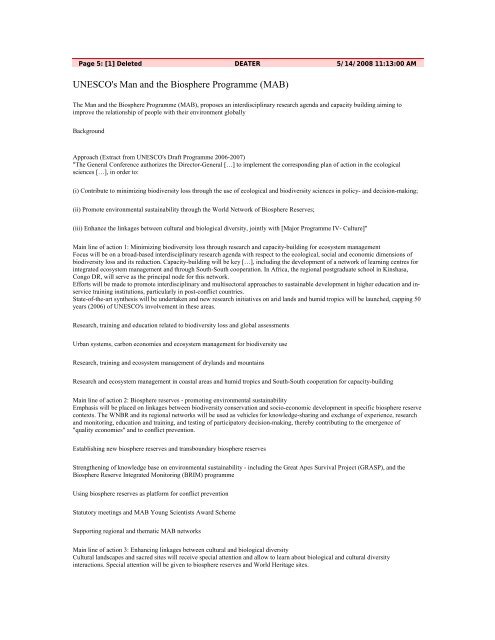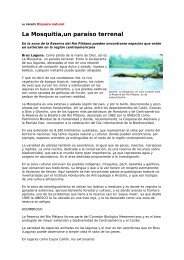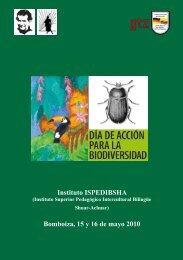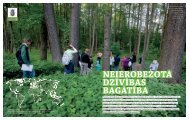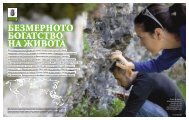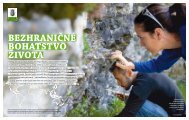speech delivered by the honourable deputy minister, ms rejoice ...
speech delivered by the honourable deputy minister, ms rejoice ...
speech delivered by the honourable deputy minister, ms rejoice ...
Create successful ePaper yourself
Turn your PDF publications into a flip-book with our unique Google optimized e-Paper software.
Page 5: [1] Deleted DEATER 5/14/2008 11:13:00 AM<br />
UNESCO's Man and <strong>the</strong> Biosphere Programme (MAB)<br />
The Man and <strong>the</strong> Biosphere Programme (MAB), proposes an interdisciplinary research agenda and capacity building aiming to<br />
improve <strong>the</strong> relationship of people with <strong>the</strong>ir environment globally<br />
Background<br />
Approach (Extract from UNESCO's Draft Programme 2006-2007)<br />
"The General Conference authorizes <strong>the</strong> Director-General […] to implement <strong>the</strong> corresponding plan of action in <strong>the</strong> ecological<br />
sciences […], in order to:<br />
(i) Contribute to minimizing biodiversity loss through <strong>the</strong> use of ecological and biodiversity sciences in policy- and decision-making;<br />
(ii) Promote environmental sustainability through <strong>the</strong> World Network of Biosphere Reserves;<br />
(iii) Enhance <strong>the</strong> linkages between cultural and biological diversity, jointly with [Major Programme IV- Culture]"<br />
Main line of action 1: Minimizing biodiversity loss through research and capacity-building for ecosystem management<br />
Focus will be on a broad-based interdisciplinary research agenda with respect to <strong>the</strong> ecological, social and economic dimensions of<br />
biodiversity loss and its reduction. Capacity-building will be key […], including <strong>the</strong> development of a network of learning centres for<br />
integrated ecosystem management and through South-South cooperation. In Africa, <strong>the</strong> regional postgraduate school in Kinshasa,<br />
Congo DR, will serve as <strong>the</strong> principal node for this network.<br />
Efforts will be made to promote interdisciplinary and multisectoral approaches to sustainable development in higher education and inservice<br />
training institutions, particularly in post-conflict countries.<br />
State-of-<strong>the</strong>-art syn<strong>the</strong>sis will be undertaken and new research initiatives on arid lands and humid tropics will be launched, capping 50<br />
years (2006) of UNESCO's involvement in <strong>the</strong>se areas.<br />
Research, training and education related to biodiversity loss and global assessments<br />
Urban syste<strong>ms</strong>, carbon economies and ecosystem management for biodiversity use<br />
Research, training and ecosystem management of drylands and mountains<br />
Research and ecosystem management in coastal areas and humid tropics and South-South cooperation for capacity-building<br />
Main line of action 2: Biosphere reserves - promoting environmental sustainability<br />
Emphasis will be placed on linkages between biodiversity conservation and socio-economic development in specific biosphere reserve<br />
contexts. The WNBR and its regional networks will be used as vehicles for knowledge-sharing and exchange of experience, research<br />
and monitoring, education and training, and testing of participatory decision-making, <strong>the</strong>re<strong>by</strong> contributing to <strong>the</strong> emergence of<br />
"quality economies" and to conflict prevention.<br />
Establishing new biosphere reserves and transboundary biosphere reserves<br />
Streng<strong>the</strong>ning of knowledge base on environmental sustainability - including <strong>the</strong> Great Apes Survival Project (GRASP), and <strong>the</strong><br />
Biosphere Reserve Integrated Monitoring (BRIM) programme<br />
Using biosphere reserves as platform for conflict prevention<br />
Statutory meetings and MAB Young Scientists Award Scheme<br />
Supporting regional and <strong>the</strong>matic MAB networks<br />
Main line of action 3: Enhancing linkages between cultural and biological diversity<br />
Cultural landscapes and sacred sites will receive special attention and allow to learn about biological and cultural diversity<br />
interactions. Special attention will be given to biosphere reserves and World Heritage sites.


